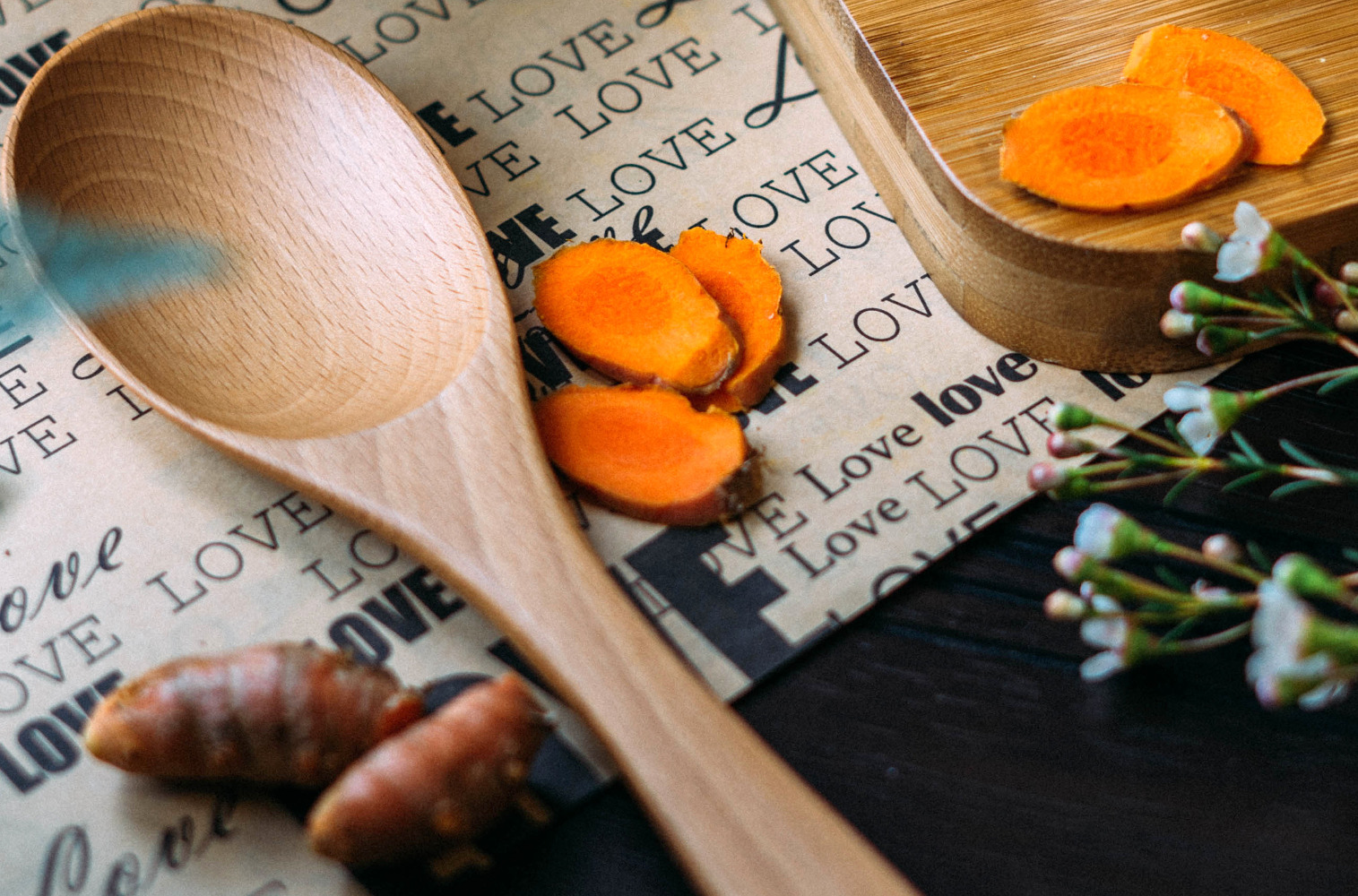Scientific Name: Curcuma Longa

Type: Root Spice
Belonging to the Ginger family , Turmeric is the root of Curcuma Longa. Most commonly known for the bright colour it lends to curries, this Golden Spice contains powerful bioactive compounds such as curcumin, volatile oil and curcuminoids1 .
These compounds have been shown to possess anti-inflammatory and anti-cancer properties in addition to improving brain function.
Some Beneficial Properties
Anti-inflammatoryThe potent compounds in Turmeric can combat and inhibit the symptoms of many diseases that are linked to Chronic Inflammation such as arthritis2,3,4 , kidney inflammation5 and diabetes6 to name a few. It also has notable pain relieving properties7.
Anti-Cancer
Cancer refers to a group of diseases that are characterised by abnormal cell growth within the human body. The active compounds in Turmeric, have been shown to be effective in preventing and treating various stages of cancers - most notably colorectal8 and pancreatic9.
Brain Function
Neurodegeneration occurs when nerve cells in the brain or nervous system gradually lose function.
Tumeric's powerful antioxidant and anti-inflammatory properties have been found to have neuroprotective effects10 that may help prevent or treat various diseases such as Alzheimer’s,Parkinsons and Stroke 11
1 : Amalraj A, Pius A, Gopi S, Gopi S. (2016)
Biological activities of curcuminoids, other biomolecules from turmeric and their derivatives - A review.
J Tradit Complement Med. 2016 Jun 15;7(2):205-233. doi: 10.1016/j.jtcme.2016.05.005.
eCollection 2017 Apr. Review. PubMed PMID: 28417091; PubMed Central PMCID:
PMC5388087.
https://www.ncbi.nlm.nih.gov/pubmed/28417091
2 : Chandran B, Goel A. (2012)
A randomized, pilot study to assess the efficacy and safety of curcumin in patients with active rheumatoid arthritis.
Phytother Res.2012 Nov;26(11):1719-25. doi: 10.1002/ptr.4639.
Epub 2012 Mar 9. PubMed PMID:22407780.
https://www.ncbi.nlm.nih.gov/pubmed/22407780
3: Dagur, R.S., Khattri, S., Kumar, S., Srivastava, S., & Saksena, A.K. (2016).
Curcuma longa extract reduces inflammatory and oxidative stress biomarkers in osteoarthritis of knee: a four-month, double-blind, randomized, placebo-controlled trial.
Inflammopharmacology, 1-12.
https://www.semanticscholar.org/paper/Curcuma-longa-extract-reduces-inflammatory-and-Srivastava-Saksena/1db2dd17c2953fc1b3ea073d75b54f4a7e1c1f22
4: Kuptniratsaikul V, Thanakhumtorn S, Chinswangwatanakul P, Wattanamongkonsil L, Thamlikitkul V. (2009)
Efficacy and safety of Curcuma domestica extracts in patients with knee osteoarthritis.
J Altern Complement Med. 2009 Aug;15(8):891-7.
doi: 10.1089/acm.2008.0186. PubMed PMID: 19678780.
https://www.ncbi.nlm.nih.gov/pubmed/19678780
5 : Khajehdehi P, Zanjaninejad B, Aflaki E, Nazarinia M, Azad F, Malekmakan L, Dehghanzadeh GR. (2012)
Oral supplementation of turmeric decreases proteinuria, hematuria, and systolic blood pressure in patients suffering from relapsing or
refractory lupus nephritis: a randomized and placebo-controlled study.
J Ren Nutr. 2012 Jan;22(1):50-7. doi: 10.1053/j.jrn.2011.03.002. Epub 2011 Jul 13.
PubMed PMID: 21742514.
. https://www.ncbi.nlm.nih.gov/pubmed/21742514
6 : Khajehdehi P, Pakfetrat M, Javidnia K, Azad F, Malekmakan L, Nasab MH, Dehghanzadeh G. (2011)
Oral supplementation of turmeric attenuates proteinuria,
transforming growth factor-β and interleukin-8 levels in patients with overt type
2 diabetic nephropathy: a randomized, double-blind and placebo-controlled study.
Scand J Urol Nephrol. 2011 Nov;45(5):365-70. doi: 10.3109/00365599.2011.585622.
Epub 2011 May 31. PubMed PMID: 21627399.
https://www.ncbi.nlm.nih.gov/pubmed/21627399
7 : Agarwal KA, Tripathi CD, Agarwal BB, Saluja S.(2011)
Efficacy of turmeric (curcumin) in pain and postoperative fatigue after laparoscopic cholecystectomy:
a double-blind, randomized placebo-controlled study.
Surg Endosc. 2011 Dec;25(12):3805-10. doi: 10.1007/s00464-011-1793-z.
Epub 2011 Jun 14. PubMed PMID: 21671126.
https://www.ncbi.nlm.nih.gov/pubmed/21671126
8: He ZY, Shi CB, Wen H, Li FL, Wang BL, Wang J. (2011)
Upregulation of p53 expression in patients with colorectal cancer by administration of curcumin.
Cancer Invest. 2011 Mar;29(3):208-13. doi: 10.3109/07357907.2010.550592. PubMed PMID: 21314329.
https://www.ncbi.nlm.nih.gov/pubmed/21314329
9: Dhillon Navneet, Bharat B. Aggarwal, Robert A. Newman, Robert A. Wolff, Ajaikumar B. Kunnumakkara, James L. Abbruzzese, Chaan S. Ng, Vladimir Badmaev and Razelle Kurzrock (2008)
Phase II Trial of Curcumin in Patients with Advanced Pancreatic Cancer.
Clin Cancer Res July 15 2008 (14) (14) 4491-4499; DOI: 10.1158/1078-0432.CCR-08-0024
http://clincancerres.aacrjournals.org/content/14/14/4491
10 : Liu Y, Dargusch R, Maher P, Schubert D. (2008)
A broadly neuroprotective derivative of curcumin.
J Neurochem. 2008 May;105(4):1336-45. doi: 10.1111/j.1471-4159.2008.05236.x. Epub 2008 Jan 18. PubMed PMID: 18208543.
https://www.ncbi.nlm.nih.gov/pubmed/18208543
11 :Cole, G. M., Teter, B., & Frautschy, S. A. (2007).
NEUROPROTECTIVE EFFECTS OF CURCUMIN.
Advances in Experimental Medicine and Biology, 595, 197–212.
https://www.ncbi.nlm.nih.gov/pmc/articles/PMC2527619/
